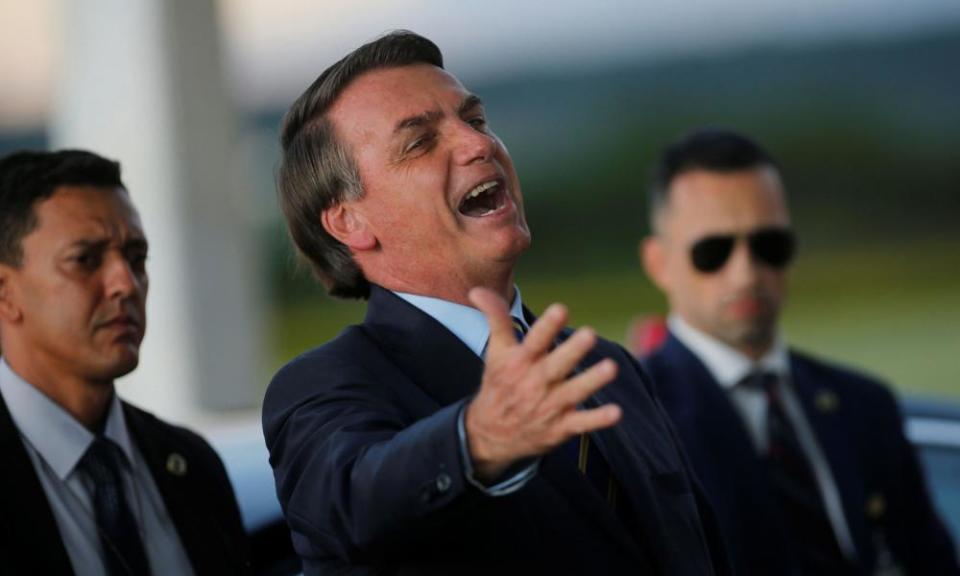Bolsonaro ignored by state governors amid anger at handling of Covid-19 crisis

Brazil’s president Jair Bolsonaro is facing a growing backlash over his handling of the coronavirus crisis, with the state governors responsible for more than 200 million of the country’s 210 million people refusing to follow his commands over the pandemic.
Bolsonaro has repeatedly played down the dangers of Covid-19 and last week urged Brazilians to get back to work – in defiance of advice from the World Health Organization and his own health ministry.
But his exhortations have been largely ignored by politicians and the general public.
Just three of Brazil’s 27 states, home to 5.7 million people, have relaxed social isolation measures as coronavirus cases continue to rise – Brazil has 5,717 confirmed cases and 201 deaths. A study showed almost 60% of Brazilians are staying at home.
Related: Bolsonaro threatens to sack health minister over coronavirus criticism
João Doria, the governor of Brazil’s most populous and economically important state, São Paulo, has maintained a strict quarantine and this week openly defied Bolsonaro, telling its 44 million citizens: “Do not follow the guidance of the president.”
Wilson Witzel, Rio de Janeiro state’s rightwing governor, has also refused to back away from strict social isolation measures.
“So far I’ve been asking, now I am giving an order: don’t leave your home,” Witzel told his state’s 17 million residents on Monday as he extended Rio’s shut down for another fortnight.
Witzel, a one-time Bolsonaro ally, went on to suggest the president’s behaviour could land him a trial at the International Criminal Court in the Hague.
Only the rightwing governors of the Amazon states of Rondônia and Roraima, both Bolsonaro allies, have followed the president’s lead by relaxing restrictions on shops and businesses. In Roraima’s capital Boa Vista and Rondônia’s capital Porto Velho many – but not all - shops are open and there are people on the streets. In Mato Grosso shops have also partially re-opened.
Ciro Gomes, a prominent leftwing politician from north-eastern Brazil, told the Guardian that in order to save thousands of lives, the country now needed – and was starting to witness – “an extensive campaign of civil disobedience initiated by governors, mayors, the overwhelming majority of religious leaders and the media”.
Gomes admitted the loss of many lives was now inevitable – but such a mutiny against Bolsonaro could help lessen the scale of the tragedy and represented “an act of protection for the Brazilian people”.
Bolsonaro has described coronavirus as a “little flu” and claimed his athletic background would protect him from it. “You have to face it like a soldier on the battlefield,” he told Rede TV on Monday. The previous day he told reporters: “We’ll all die one day.”
The president has argued the damage caused by shutting down Brazil’s economy will be worse than that caused by the virus, and has also suggested state governors were inflating the numbers of coronavirus victims to justify restrictive lockdown measures.
But as well as facing a rebellion from regional chiefs, Bolsonaro now also appears increasingly isolated from his own cabinet.
Related: Bolsonaro's anti-science response to coronavirus appals Brazil's governors
At a press conference with other ministers on Monday, Bolsonaro’s health minister Luiz Mandetta called on people to follow state governments and maintain the “the maximum degree of social isolation” – a day after the president mingled with people on the streets of Brasília and said he was considering a decree to let them go back to work.
On Tuesday the Folha de São Paulo newspaper reported that justice minister Sérgio Moro, finance minister Paulo Guedes, Mandetta and military officers in the government had formed a block opposing the president’s stance.
“Bolsonaro has put himself into self-isolation,” said José Álvaro Moisés, a professor of political science at the University of São Paulo.
Additional reporting by in Rio de Janeiro Tom Phillips

